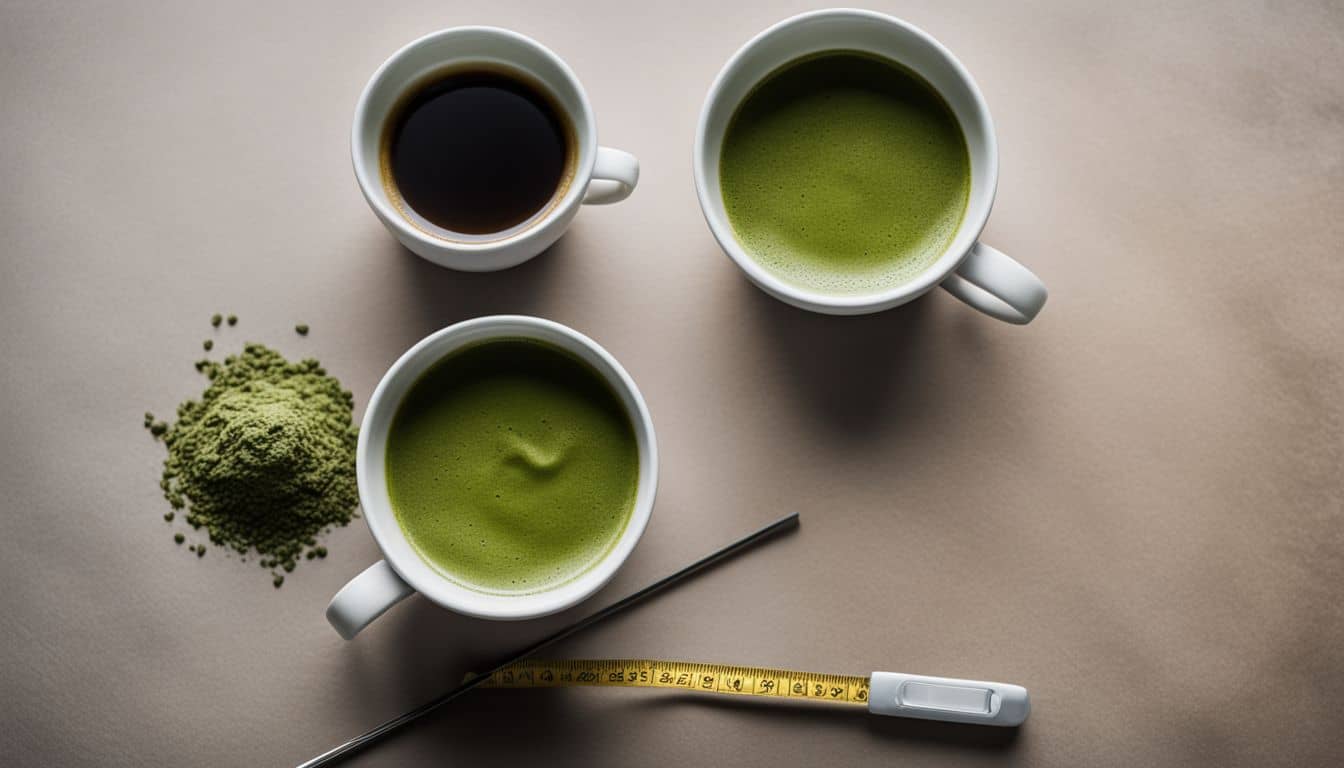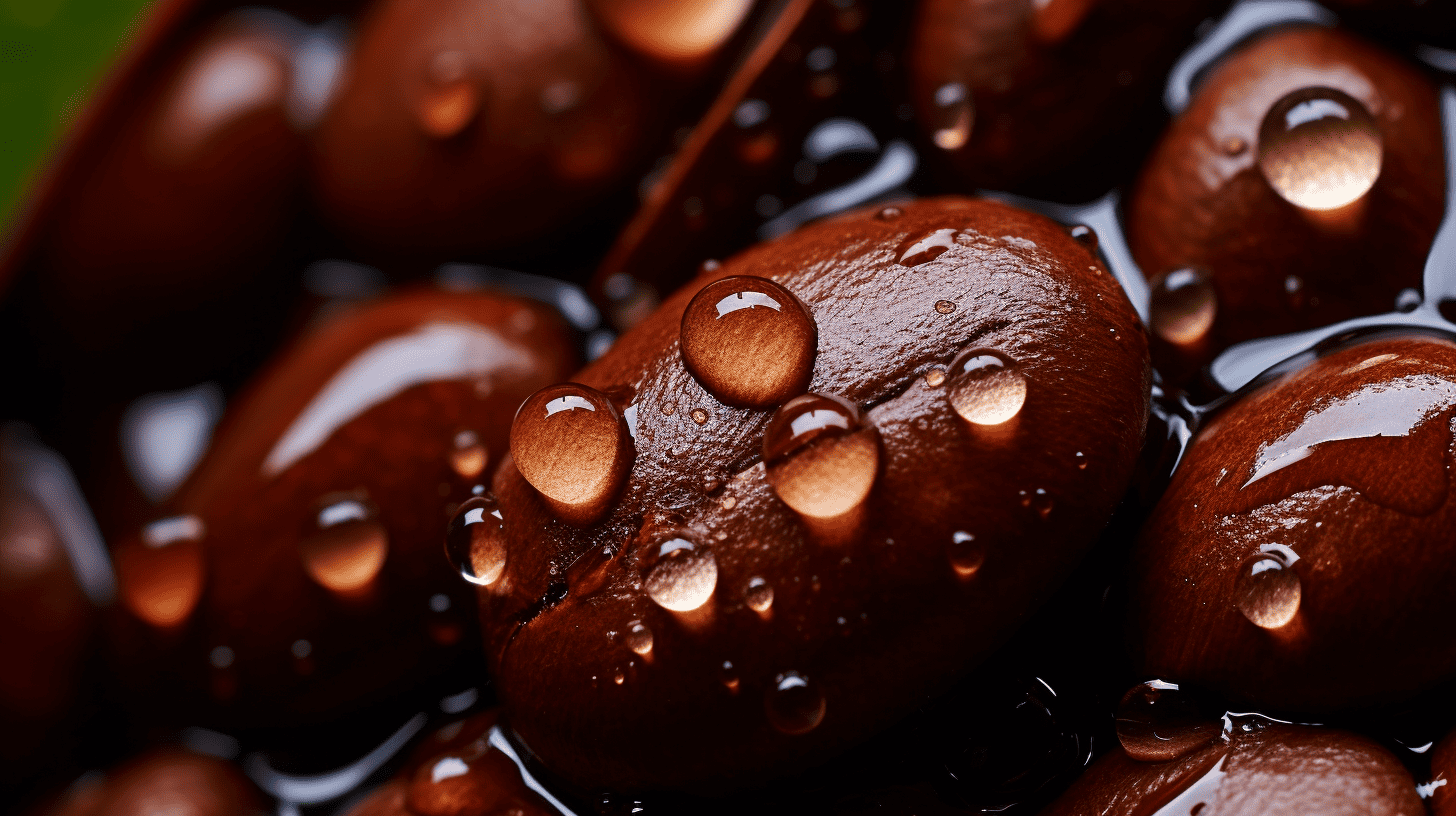Are you struggling to choose between matcha vs coffee weight loss? I feel you; the confusion is real because both beverages have their unique advantages. However, after deep-diving into numerous studies on this topic, it’s clear which one can offer excellent benefits.
This article uncovers the pros and cons of both matcha and coffee concerning weight management – giving you a clear picture to help make an informed dietary choice. Ready for some brewing insights?
Key Takeaways
- Matcha has more antioxidants and amino acids compared to coffee, making it a healthier choice for overall health and cognition.
- Both matcha and coffee can potentially aid in weight loss by boosting metabolism and increasing fat burning.
- Matcha is calorie – free, while coffee contains a small number of calories (2 per 8 fl oz).
- Matcha provides sustained energy without jitters or crashes, unlike coffee.
Comparing Nutrients and Benefits of Matcha and Coffee
Matcha and coffee offer different nutrients and benefits.
Nutrient comparison
When comparing the nutrient content of matcha and coffee, there are a few key differences to highlight.
| Nutrient | Matcha | Coffee |
|---|---|---|
| Caffeine | 35mg per 1g of powder | 95mg per 8 fl oz |
| Calories | Zero | 2 calories per 8 fl oz |
| Antioxidants | Rich in catechins | Limited |
| Amino Acids | Contains L-Theanine, helping improve cognitive function | Does not contain |
| Vitamins & Minerals | Packed with vitamin C, selenium, chromium, zinc, and magnesium | Contains small amounts of vitamins B2, B3, and B5, manganese, potassium, and magnesium |
This table lays out the difference between matcha and coffee nutritionally. Matcha packs more of a punch in terms of antioxidants and amino acids, which are beneficial for overall health and cognition. It also contains no calories, making it a great choice if you’re trying to cut down. Coffee, on the other hand, has higher caffeine content, which may help with energy and focus. However, it may lack in other areas such as antioxidant content and the presence of beneficial amino acids.
Shared benefits (antioxidants, potential weight loss, etc.)
Matcha and coffee offer shared benefits that can contribute to weight loss and overall health. Both beverages contain antioxidants, which help protect the body from damage caused by harmful molecules called free radicals.
These antioxidants promote a healthy immune system and can potentially reduce the risk of chronic diseases.
When it comes to weight loss, both matcha and coffee have been studied for their potential effects. Matcha contains catechins, a type of antioxidant that has been shown to regulate blood pressure and possibly aid in weight management.
Coffee, on the other hand, contains caffeine, which may boost metabolism and increase fat burning.
It’s important to note that while both matcha and coffee might provide benefits for weight loss, they should be consumed as part of a balanced diet and healthy lifestyle. It’s also worth considering personal preferences when choosing between these beverages, as taste and cost can vary.

Main differences (caffeine, amino acids)
When it comes to the main differences between matcha and coffee, there are two key factors: caffeine and amino acids. Matcha contains a moderate amount of caffeine (about half the amount found in a cup of coffee), which can provide an energy boost without causing jitters or anxiety.
Coffee, on the other hand, has higher levels of caffeine that may lead to increased alertness but can also cause restlessness and sleep disturbances. Additionally, matcha contains an amino acid called L-Theanine, which promotes relaxation and mental clarity.
This combination of caffeine and L-Theanine in matcha provides a balanced energy boost without the crash often associated with coffee consumption.
Weight Loss Potential of Matcha and Coffee
Matcha and coffee both have the potential to aid in weight loss through their impact on metabolism and fat burning.
Research on green tea and weight loss
Some studies suggest that green tea, including matcha, may have a link to weight loss. Green tea contains catechins, which are antioxidants that can potentially help regulate blood pressure and contribute to weight loss.
Matcha has been shown to improve metabolism and burn fat, leading to higher energy levels and potential weight loss. The caffeine content in matcha activates brown adipose tissue (brown fat) and increases energy expenditure, helping with weight management.
If you’re looking for a healthier alternative to coffee for weight loss, matcha could be a good choice due to its potential benefits for metabolism and overall health.
Activating brown adipose tissue
Activating brown adipose tissue, also known as brown fat, is a key factor in weight loss. Both matcha and coffee can help with this activation because they contain caffeine. Brown fat is a special type of fat that burns calories to generate heat and increase energy expenditure.
When activated, it can help boost metabolism and burn stored fat. Caffeine has been shown to stimulate the activity of brown fat, leading to increased calorie burning. So whether you prefer matcha or coffee, both beverages can potentially aid in weight loss by activating brown adipose tissue and increasing your body’s energy expenditure.
Increasing energy expenditure
Matcha and coffee can both help increase energy expenditure, which is important for weight loss. This is because they contain caffeine, which can stimulate the body’s metabolism and boost calorie burning.
Research suggests that caffeine may activate brown adipose tissue (brown fat), which plays a role in burning calories and regulating body temperature. So, by consuming matcha or coffee, you could potentially give your energy levels a natural lift and support your weight loss goals.
Pros and Cons of Matcha for Weight Loss
Matcha offers numerous benefits for weight loss, including a boosted metabolism, increased energy levels, and high antioxidants. However, it may be costly and not everyone enjoys the taste.
Intrigued to learn more? Keep reading!
Benefits of matcha (metabolism, energy, antioxidants)
Matcha has several benefits that can support weight loss and overall health. Here are some of the key advantages:
- Boosts metabolism: Matcha has been shown to improve metabolism, which is the rate at which your body burns calories. This can help you burn more fat and potentially lose weight.
- Provides sustained energy: Matcha contains a combination of caffeine and other natural compounds that provide a gentle and sustained energy boost. Unlike coffee, matcha doesn’t result in jitters or a crash later on.
- Rich in antioxidants: Matcha is packed with antioxidants called catechins, which help protect your cells from damage and support overall health. These antioxidants may also contribute to weight loss by regulating blood pressure and reducing inflammation.
- Helps control appetite: The combination of caffeine and amino acids in matcha can help suppress appetite, making it easier to stick to a healthy eating plan and avoid unnecessary snacking.
Downsides of matcha (cost, taste)
Matcha may not be a perfect choice for everyone. Here are a few downsides to consider:
- Cost: Matcha can be more expensive compared to regular tea or coffee. The high-quality matcha, which is often recommended, comes at an even higher price.
- Taste: Matcha has a distinct taste that is earthy and slightly bitter. Some people may find it too strong or unusual compared to the familiar taste of coffee.
- Availability: Finding matcha may be a bit challenging, especially in areas where it is not as popular. It may require searching for specialty stores or ordering online.
- Preparation: Preparing matcha requires some specific techniques, like whisking it properly with hot water or milk. This extra step may take more time and effort compared to brewing a cup of coffee.
- Caffeine sensitivity: While matcha contains less caffeine compared to coffee, some individuals may still be sensitive to its effects. If you are sensitive to caffeine or have any medical conditions that require limiting caffeine intake, it’s important to consult with your healthcare provider before consuming matcha regularly.

Pros and Cons of Coffee for Weight Loss
Coffee can be a beneficial beverage for weight loss due to its caffeine content, which can help with appetite suppression and boost metabolism. However, it’s important to consider the downsides such as acidity and potential dependency.
To learn more about how coffee can impact your weight loss journey, keep reading.
Benefits of coffee (caffeine, appetite suppression)
Coffee has some benefits when it comes to weight loss. Here are a few:
- Caffeine in coffee can help increase metabolism and burn fat, leading to potential weight loss.
- Coffee may suppress appetite, making you feel fuller for longer periods and reducing calorie intake.
- Consuming coffee before a workout can boost energy levels and enhance productivity during exercise.
- Unlike matcha, coffee is widely available and comes in various forms like espresso, decaf, or instant, allowing for more options based on individual preferences.
- Drinking coffee in moderation can provide a range of health benefits beyond weight loss, such as reducing the risk of certain diseases like Parkinson’s and Alzheimer’s.
Downsides of coffee (acidic, potential dependency)
Coffee has some downsides that you should know about, especially if you’re a coffee enthusiast like me. Here are a few things to consider:
- Acidic Nature: Coffee is known for its high acidity levels, which can cause stomach discomfort, acid reflux, and even tooth enamel erosion over time. It’s important to be mindful of your overall acidity intake and take steps to protect your digestive health.
- Potential Dependency: Drinking coffee regularly can lead to dependency or addiction due to its caffeine content. If you find that you rely heavily on coffee to function throughout the day and experience withdrawal symptoms when you don’t have it, it may be worth exploring ways to reduce your caffeine intake and find alternative sources of energy.
- Impact on Sleep: The stimulating effects of coffee can interfere with quality sleep, especially if consumed in the afternoon or evening. Poor sleep can negatively affect weight loss efforts by disrupting metabolism and increasing cravings for unhealthy food choices.
- Added Calories: While black coffee itself is low in calories, many popular coffee drinks come with added sugars, syrups, creamers, and whipped toppings that can significantly increase calorie intake. These extra calories can hinder weight loss progress if not accounted for in your overall daily calorie intake.
- Dehydration: Coffee is a diuretic, meaning it increases urine production and can contribute to dehydration if not balanced with adequate water consumption. Dehydration can affect energy levels and overall well-being.
Conclusion: Choosing the Right Beverage for Weight Loss
When it comes to weight loss, both matcha and coffee can be beneficial. Matcha has been shown to improve metabolism and burn fat, while the caffeine in both beverages can activate brown fat for increased energy expenditure.
However, matcha may be a healthier choice due to its multiple health benefits and zero calorie content. Ultimately, choosing the right beverage depends on personal preferences and goals.
Which Provides More Energy: Coffee or Monster Zero?
In the coffee vs monster zero showdown, both drinks offer an energy boost, but their effects differ. Coffee, a popular choice, contains caffeine that stimulates the nervous system. On the other hand, Monster Zero, an energy drink, combines caffeine with additional ingredients like taurine and B vitamins. Ultimately, personal preferences play a key role in determining which one provides more energy.
FAQs on Matcha Vs Coffee Weight Loss
1. Is matcha or coffee better for weight loss?
Matcha is often considered a healthier option for weight loss as it contains fewer calories and provides a longer-lasting energy boost compared to coffee.
2. How does matcha help with weight loss?
Matcha can aid in weight loss due to its high concentration of antioxidants and metabolism-boosting properties, which may promote fat burning and increase calorie expenditure.
3. Can coffee help with weight loss?
Coffee can have some impact on weight loss due to its ability to increase metabolism temporarily and suppress appetite, but it is important to consume it in moderation without adding excessive sugar or cream.
4. Are there any side effects of consuming matcha or coffee for weight loss?
While both matcha and coffee are generally safe when consumed in moderation, excessive consumption may lead to side effects such as caffeine jitters, digestive issues, or disrupted sleep patterns. It’s best to monitor your intake and listen to your body’s response.





Leave a Reply